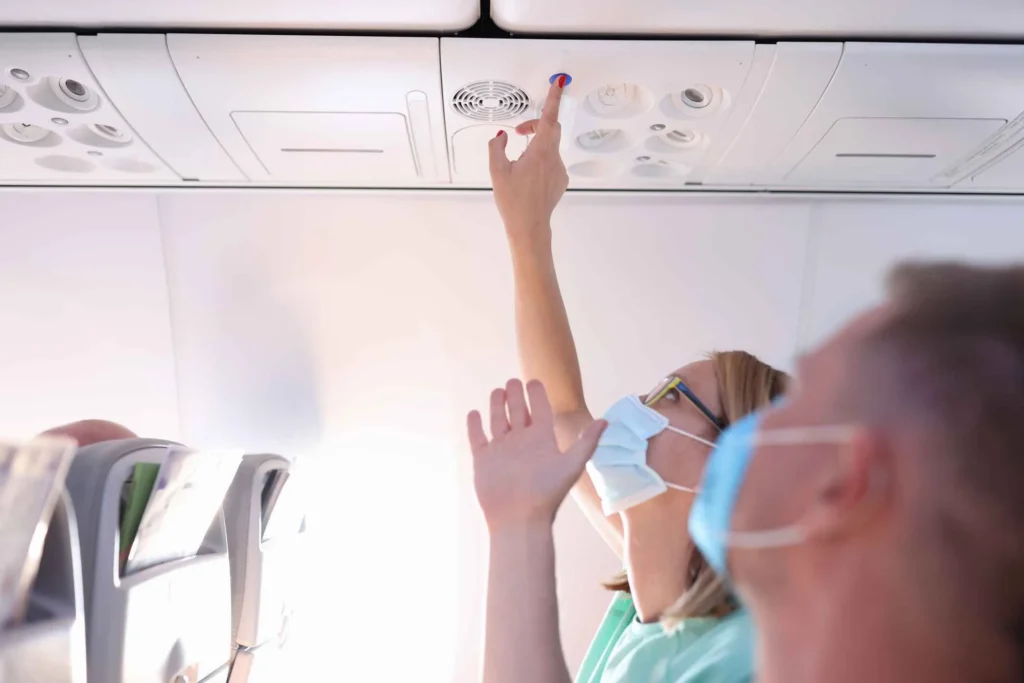Who’s liable for inflight medical emergencies?
Aviation Accidents - August 18, 2023
Dealing with health crises several thousand feet above ground can be far more complex than handling them on the ground. This complexity increases when determining the legal liability for inflight medical emergencies during commercial travel.
Here are some of the most frequently asked questions about liability for inflight medical emergencies.
What counts as an inflight medical emergency?
An airline medical emergency is any situation where a passenger becomes severely ill, injured, or incapacitated aboard an aircraft. These emergencies range from heart attacks and strokes to acute allergic reactions and traumatic injuries.
Who is typically responsible for responding to inflight medical emergencies?
The primary responsibility for responding to inflight medical emergencies usually falls on the flight attendants trained in basic first aid and emergency procedures. They may often ask if any medical professionals on board can assist. Airlines may also contact a ground-based medical support company to guide them in assisting the passenger.
What if a passenger experiences a medical emergency due to a pre-existing condition inflight?
While inflight medical emergencies can arise from various sources, the situation becomes notably complex when it involves a passenger with a pre-existing medical condition.
In general, airlines are not liable for medical events caused by a passenger’s pre-existing condition, particularly if they were not notified about their health status before the flight. This is largely because airlines, while they have a duty of care towards their passengers, are not in a position to provide the same level of medical care as a hospital.
However, this lack of liability assumes that airlines have fulfilled their duty of care. The duty of care is a legal obligation that requires airlines to ensure a safe environment for their passengers. This could include providing necessary first aid, making an emergency landing if required, or having an Automated External Defibrillator (AED) on board.
Who is liable if a passenger’s condition worsens because of inadequate or delayed inflight medical care?
The answer to this depends on the specific circumstances of each case. In general, airlines have a duty of care toward their passengers, which includes providing appropriate medical assistance in emergencies.
If this duty is breached—for example, if there is negligence on the part of the flight crew or if the airline did not equip the aircraft with appropriate medical equipment—the airline could potentially be liable. However, liability can be complex to determine and generally requires the expertise of an aviation lawyer.
Is a volunteering medical professional liable if their inflight intervention leads to complications?
Inflight medical emergencies require immediate response, and it is not uncommon for medical professionals present on the flight to offer their assistance. The question of liability for these volunteering medical professionals is guided by the Good Samaritan laws prevalent in many jurisdictions.
Good Samaritan laws are legal provisions designed to reduce bystanders’ hesitation to assist for fear of being prosecuted for wrongful death or injuries. These laws protect individuals who provide reasonable assistance to those who are injured, ill, in peril, or otherwise incapacitated.
Under these laws, medical professionals who volunteer their help during inflight emergencies are generally shielded from legal liability for any adverse outcomes of their intervention. The intent is to encourage immediate response to emergencies without fearing legal repercussions.
Can a Chicago aviation accident lawyer help if someone experiences an inflight medical emergency during commercial travel?
A Chicago aviation accident lawyer can help passengers or their families understand their rights and legal options following an inflight medical emergency. These professionals can review the facts of the case, determine potential negligence or liability, and guide the client through the legal process.
Contact us online or call (800) 985-1819 for a free consultation.



